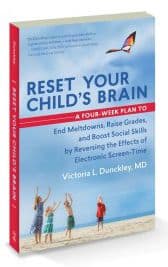Does Your Child’s Brain Need to Be Reset?
Dr. Victoria Dunckley, an integrative psychiatrist in Los Angeles, says she’s helped more than five hundred children, teens, and young adults by “resetting” their brains. According to her, they needed this intervention because they all had a condition she calls Electronic Screen Syndrome (ESS).
Dunckley suggests ESS can mimic a wide variety of psychiatric, neurological, and behavioral disorders that are exacerbated or created by screen time. By this, she is referring to the interactive screens used widely today in video games, laptops, cell phones, tablets and other handheld devices.
Reportedly, in a ten-year span from 1994 to 2003, the diagnosis of bipolar disorder in children has increased forty-fold. Childhood mental disorders such as ADHD, autism spectrum disorders, and tic disorders are on the rise. Between 2002 and 2005, ADHD medication prescriptions rose by forty percent and between 2008 and 2012 another 36%. Mental illness is now the number one reason for disability filings for children, representing half of all claims filed in 2012 compared to just 5 to 6 percent of claims twenty years prior.
Readers of our Latitudes.org website would know that a number of factors are targeted by the public and medical community as potential players in the dramatic increase of childhood chronic illnesses. While researchers consider the role of pesticides and fungicides, food dyes, a range of plastics, GMOs, fast food and junk foods, vaccines, toxic chemicals in home and personal products, electromagnetic radiation and other factors, Dr. Dunckley is talking about interactive screen time (including texting) as a major piece of the puzzle.
 Video games. Cell phones for kids of all ages. Mini-computers with learning games for toddlers. IPads handed out for use at school. Screens have increasingly become part a child’s daily life, from toddler age through teens. Dr. Dunckley proposes that young brains and nervous systems are simply not developed enough to handle the visual onslaught received, in addition to the electromagnetic radiation that may be involved. As a result, the brain becomes dysregulated and this affects learning, neurological functioning, mood and behavior.
Video games. Cell phones for kids of all ages. Mini-computers with learning games for toddlers. IPads handed out for use at school. Screens have increasingly become part a child’s daily life, from toddler age through teens. Dr. Dunckley proposes that young brains and nervous systems are simply not developed enough to handle the visual onslaught received, in addition to the electromagnetic radiation that may be involved. As a result, the brain becomes dysregulated and this affects learning, neurological functioning, mood and behavior.
Her new book, Reset Your Child’s Brain: A Four-Week Plan to End Meltdowns, Raise Grades, and Boost Social Skills by Reversing the Effects of Electronic Screens she tells us why her intervention should be considered as a no-cost treatment, and how to implement the plan.
Medical journalist Jessica Solodar says, “Victoria Dunckley makes a convincing case that parents should be very concerned about their children’s constant exposure to electronic screen–based entertainment. Citing medical research as well as her work with hundreds of patients, Dr. Dunckley explains how electronic media overwhelm children’s nervous systems and impair their physical and mental functioning. Families who follow her practical approach to discontinuing electronic screen-time will see dramatic improvement in their children’s health and behavior.”
Our organization (ACN Latitudes) has reported that screen exposures can trigger tics and stress in people, with interactive screens having an even greater impact. In fact, our patient and parent survey on tic triggers is referred to in Dunckley’s book to support her point that screen time should be reduced or eliminated when someone has tics.
After successfully implementing a four-week “fast” without screen-time, Dunckley predicts families should see a big difference in behavioral and neurological complaints. She writes, “My hope is that this book empowers you to take action and inspires you to implement a treatment strategy that’s effective, broad-reaching, 100% safe, and essentially free. You can expect to see a happier child with better focus and organization, improved compliance, and more mature social interactions. Beyond relief from the worse aspects of ESS, my goal for your child is not just symptom relief, but optimization of brain, mind, and social development.”
Parent push-back to the suggestion of reducing screen time
The author has found in her practice that when she recommends eliminating screen-time or even just cutting out video games, parents often protest that “all my child’s friends do it. It’s their culture.” Parents fear that if their child stops playing or participating, they will be left out, won’t have anything to talk about or do with friends, or worse—they will be ostracized and left with no friends at all. However, she says, “I’ve worked with a wide range of children—some who were former gamers and some who never played much at all –and I’ve never seen a child’s social life suffer from restricting screen-time. If anything, the opposite happens.”
“When children stop playing video games they become more comfortable in their own skin and more comfortable relating to others. They have better access to emotions, become better at expressing those emotions appropriately, and develop a wider variety of interest. These skills help them develop richer and closer relationships with friends.”
Watch a video clip by Dr. Dunckley and learn more about Reset Your Child’s Brain
Victoria L. Dunckley, MD, is an award-winning integrative psychiatrist who has appeared as a mental health expert on such media outlets as the TODAY show, NBC Nightly News, and the Investigation Discovery network. She lives and practices in Los Angeles.










